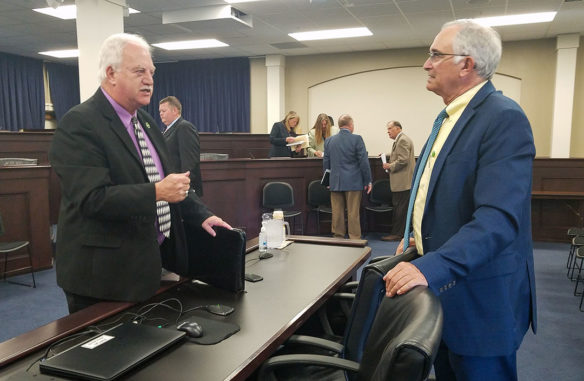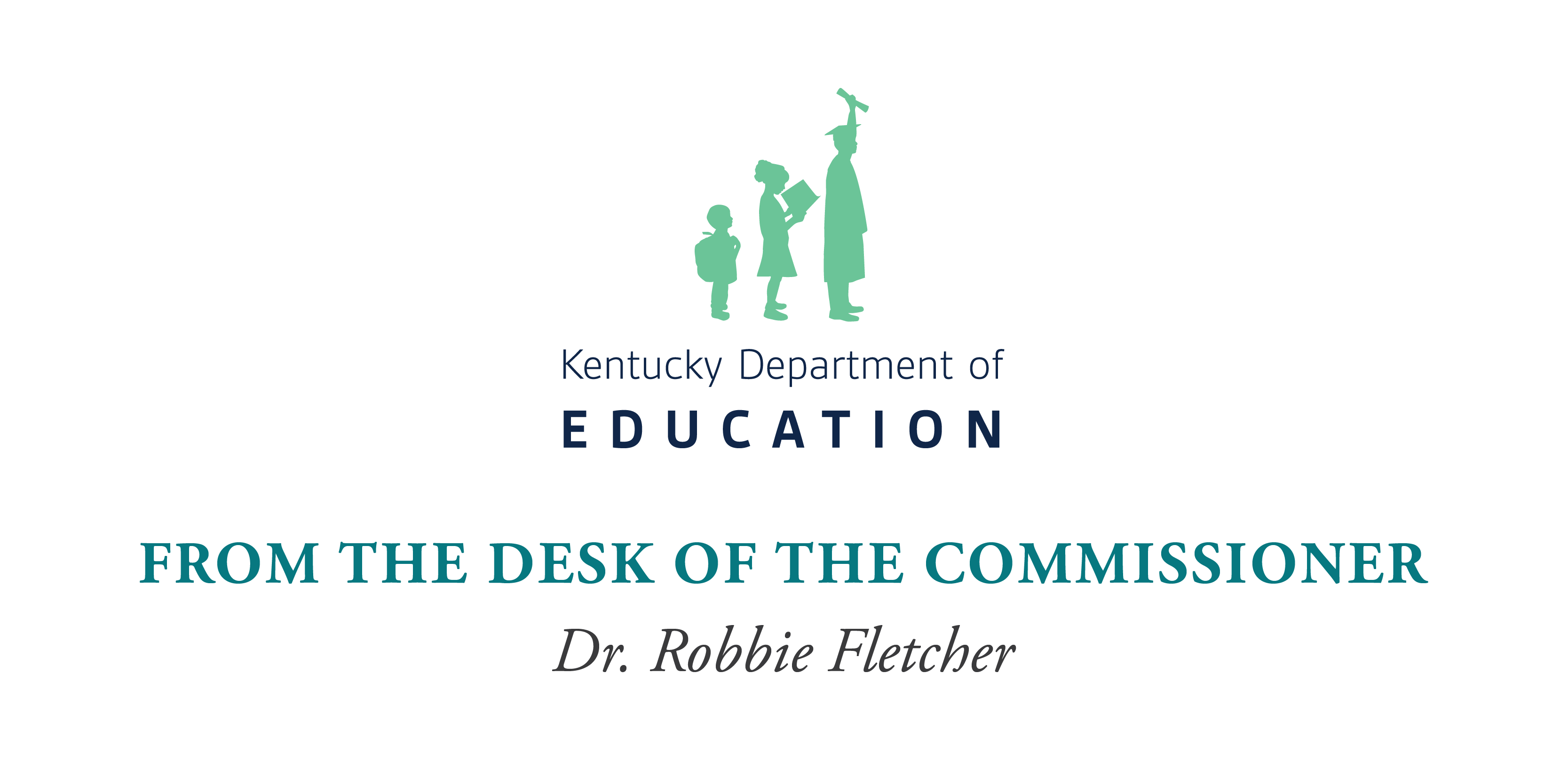
David Horseman, right, an associate commissioner at the Kentucky Department of Education, talks with Rep. Bobby McCool (R-Van Lear), co-chairman of the Kentucky Career and Technical Education Task Force, following a meeting of the task force. The panel will present recommendations to the Interim Joint Committee on Education on Nov. 20.
Photo by Mike Marsee, Oct. 2., 2019
- Associate Commissioner David Horseman said members of his staff already are working on ways to resolve conflicts between statutes and regulations that will be the first step toward creating a single system for delivering career and technical education in Kentucky.
- The Kentucky Career and Technical Education Task Force will submit recommendations to the Interim Joint Committee on Education in November.
By Mike Marsee
mike.marsee@education.ky.gov
The Kentucky Department of Education (KDE) stands ready to work with lawmakers to draft legislation that would begin the process of reforming Kentucky’s career and technical education (CTE) system.
Associate Commissioner David Horseman told a legislative task force Oct. 2 that some of that work already is underway even as the panel prepares its recommendations.
Horseman said members of his staff are working on ways to resolve conflicts between statutes and regulations that will be the first step toward creating a single system for delivering career and technical education in Kentucky.
“I’ve already asked my executive advisers to start working on language to have that ready,” Horseman said. “If we don’t get any further on anything else, we want to correct those errors and have someone ready to sponsor that for us.”
The Kentucky Career and Technical Education Task Force has been considering structural and funding reforms in CTE that might be recommended to the Kentucky General Assembly in the 2020 legislative session in an effort to ensure that all students have access to high quality CTE programs
There are 53 state-operated area technology centers and 42 local area vocational education centers that receive supplemental state funding. There also are 220 other CTE program locations that receive no supplemental state funding. The task force has examined that funding disparity, as well as inequities in programs available to students and in pay structures.
During its fifth and final scheduled meeting, members turned their focus toward the report they will present to the Interim Joint Committee on Education at its Nov. 20 meeting.
“If we’re going to be guided by what’s best for students and what’s best for taxpayers, if that’s our guiding principle, there’s going to be some difficult decisions that are not best for everyone involved,” said Sen. Mike Wilson (R-Bowling Green), who co-chairs the task force.
Horseman said the next steps for KDE involve working with lawmakers to craft legislation that focuses on the task force’s recommendations for funding career pathways, ensuring that programs receiving state funding are relevant and creating a more efficient system through regionalization and partnerships.
“We’ll be moving forward with what we think the structure needs to look like and maybe a plan for how to get the final product,” he said.
Horseman said is pleased that KDE, which asked the legislature to create the task force, will have a role in drafting bills that result from the panel’s recommendations.
“I think that helps gives us the ability to frame the conversation in a way that we think benefits students,” Horseman said.
Horseman said the move toward a unified system might best be done by degrees. He said some of the most egregious funding disparities can be addressed in the upcoming legislative session, and he said that would reduce Kentucky’s system from five different methods of funding to three or four within about a year.
“We feel like in a phased approach we could take care of some low-hanging fruit that would address the worst disparities. Then in the overall picture we can look at structure and at how to go about funding,” he said.
“There’s really not a silver bullet for this, and I would rather take it slow and do it right than jump right in.”
Wilson agrees that a single system is the way to go.
“It really needs to be one system, and that’s what we were looking at, and the funding equity is a real disparity for us,” he said.
Sen. David Givens (R-Greensburg) said there are several things he would like to see as the system evolves:
- A single equitable funding mechanism;
- Credentialing and oversight of programs by the state;
- A single governance model built around a regional framework; and
- Performance-based funding for programs.
“It’s going to take a very conscious effort by you to keep our focus on this regionalized approach,” Givens told Horseman. “I don’t want it to take 10 years to get to what’s best for students.”
Wilson said he and co-chairman Rep. Bobby McCool (R-Van Lear) will discuss the task force’s draft recommendations and determine whether another meeting of the committee will be held prior to the Nov. 20 Interim Joint Committee on Education meeting.
Horseman said he’s happy with what the task force has accomplished to this point.
I think it’s been productive,” he said. “I think the task force understands the complexities and they want to be fair and equitable.”
MORE INFO …
Coverage of previous meetings of the Kentucky Career and Technical Education Task Force:




Leave A Comment